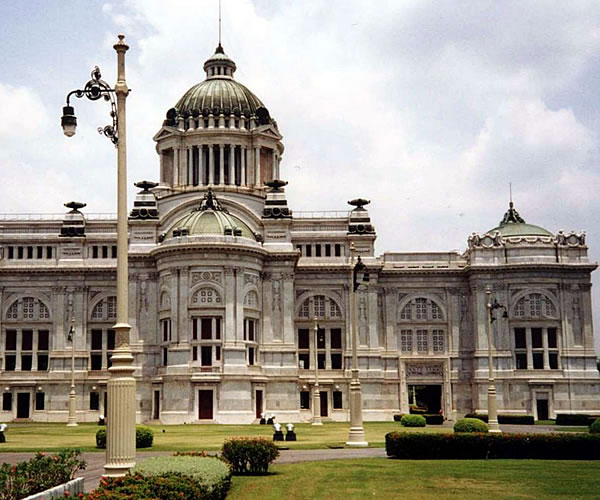
State Pension Plan in Thailand
The Pension system in Thailand is set up in three pillars
- 1st Pillar - Old Age Pension intended to secure the basic needs
- 2nd Pillar - Government Pension Fund (GPF) and the National Saving Fund. GPF is a defined contribution pension system exclusively for civil servants.
- 3rd Pillar - Privately-financed voluntary personal provision.
Recently, the government introduced the National Saving Fund (NSF), a new voluntary retirement savings program. It is intended to cover Thai citizens who are not covered by any pension schemes.
Most expats employed by a Thai Company will contribute to the Old Age Pension System.
Who is Eligible for a Thai Pension?
You must be over 55 years of age and have made more than 180 months of contributions (roughly 15 years) to receive a Thai pension.
The pension will only be paid after you stop working. If you stop working, and then take up new employment elsewhere, the pension will be immediately suspended.
Contributions for a Thai Pension
Contributions are compulsory in this pay-as-you-go pension scheme. It is financed by both the employer and the employee. Participation in the scheme is mandatory for private sector employees. The employer and the employee each pay a contribution rate of 3% of gross salary, up to a contribution assessment ceiling of 15,000 baht. The government adds an additional 1%. Contributions to the Old Age Pension are tax-deductible and benefits are tax-exempt.
Benefits of a Thai Pension
The benefit of this pension is 20% of the average earnings in the last 60 months prior to retirement. The pension will be increased by 1.5% for each 12 month additional period over the required 180 months. There is no minimum pension.
Company Pension Plan
If you work for a Thai company it is unlikely they offer a company pension plan.
If your company does allow for group plans, they usually require you to make a regular contribution based on a percentage of your salary. How to claim your pension varies according to your scheme. You can normally obtain a forecast of your earnings, when you will be able to retire, survivor's benefits, etc., from the Human Resources staff at your workplace. You can receive a tax relief on the money paid into this pension fund.
If you are working in Thailand for an international company, you should ensure your benefits by negotiating contributions into your contract.
Private Pension Plan
There are no specific private pension plans available to expats in Thailand. You may be able to create a private pension with local banks or insurance companies, but this is very uncommon.
Expats interested in establishing a private pension plan should start the plan in their home country and contribute and eventually collect from abroad.
Expat Pensions Plans
A few countries have a bilateral agreement with Thailand that allow for years worked in Thailand to count to their State pension. Inquire with your state plan about the particulars.
If your country does not allow for years worked in Thailand to count toward your state pension, there may be an opportunity to buy back time once you have returned to your home country and are once again contributing to the pension plan. Again, inquire with your state plan about the particulars.
Contributing and Collecting Pension while Abroad
You may be able to contribute and receive a foreign pension while in Thailand. For example, UK nationals should refer to the HM Revenue & Customs (HMRC) for details of managing their taxation payments and National Insurance contributions in the UK while living abroad. As long as certain conditions are met you can still pay UK National Insurance contributions voluntarily when you are abroad.
The same is true for many other countries. Payment can usually be made by a monthly direct debit or an annual lump sum payment. Some countries may also allow you to nominate an agent to make a payment on your behalf i.e. your employer. Contributions can help protect certain state benefits and allowances if you return to your home country. Let your tax office know you will be leaving the country and get details about requirements. You need to be aware that your state pension will not be linked to the inflation rate in your home country which will impact on the pension you will withdraw in Thailand.
Update 15/09/2013
Keep more of your money when transferring funds overseas!

If you want to move money abroad, from Thailand or to Thailand for example, Fexco provides efficient and secure global bank to bank transfers and bespoke payment solutions for both business and personal clients.
Why Fexco
Fexco provides a secure international money transfer service online or by telephone with bank beating fx rates and low fees. Specialises in high-value transfers.
Main characteristics
Fexco will help you to keep your overseas money transfer costs to a minimum.
| Margin | 0.6% |
|---|---|
| Regulator | FCA |
| Fee | £10 < £5K or Free > £5k |
| Mini | £1K |
| Ccy | All (130 currencies, incl ‘exotics’) |
| Services | Repatriation of funds, Property, Regular payments, High Value payments, spot, online, telephone. |
Get an online quote today
When you are ready to make your transfer, John and his team will be available to help you with better rates and an unrivalled service to make sure your funds are delivered securely and speedily.
